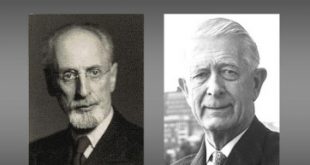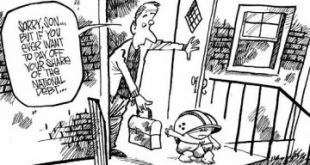This is an excellent introductory video, scripted and narrated by Geoff Coventry. It is mentioned in the YouTube comments that Stephanie Kelton and others advised on the work. No doubt the video has already appeared on other blogs. The link was provided by acorn in the comments. [embedded content]
Read More »Why should we care about Sonnenschein-Mantel-Debreu?
Along with the Arrow-Debreu existence theorem and some results on regular economies, SMD (Sonnenschein-Mantel-Debreu) theory fills in many of the gaps we might have in our understanding of general equilibrium theory … It is also a deeply negative result. SMD theory means that assumptions guaranteeing good behavior at the microeconomic level do not carry over to the aggregate level or to qualitative features of the equilibrium. It has been difficult to make progress on the...
Read More »The conundrum of unknown unknowns
The conundrum of unknown unknowns Short-term weather forecasting is possible because most of the factors that determine tomorrow’s weather are, in a sense, already there … But when you look further ahead you encounter the intractable problem that, in non-linear systems, small changes in initial conditions can lead to cumulatively larger and larger changes in outcomes over time. In these circumstances imperfect knowledge may be no more useful than no...
Read More »When ignorance is bliss
When ignorance is bliss The production function has been a powerful instrument of miseducation. The student of economic theory is taught to write Q = f(L, K) where L is a quantity of labor, K a quantity of capital and Q a rate of output of commodities. He is instructed to assume all workers alike, and to measure L in man-hours of labor; he is told something about the index-number problem in choosing a unit of output; and then he is hurried on to the next...
Read More »IPA’s weekly links
Guest post by Jeff Mosenkis of Innovations for Poverty Action. The summer ape blockbuster you’re been waiting for is here. In Science economists Seema Jayachandran, and Joost de Laat team up with satellite researchers Eric Lambin, Charlotte Stanton, Robin Audy, and Nancy Thomas (with some help from IPA and Uganda’s Chimpanzee Sanctuary and Wildlife Conservation Trust). They ran the first RCT showing that just paying farmers in Uganda a little bit not to cut down forest on their land where...
Read More »What so many critiques of economics gets right
What so many critiques of economics gets right Yours truly had a post up the other day on John Rapley’s Twilight of the Money Gods. In the main I think Rapley is right in his attack on contemporary economics and its ‘priesthood,’ although he often seems to forget that there are — yes, it’s true — more than one approach in economics, and that his critique mainly pertains to mainstream neoclassical economics. Noah Smith, however, is not too happy about the...
Read More »Ricardo’s trade paradigm — a formerly true theory
Ricardo’s trade paradigm — a formerly true theory Two hundred years ago, on 19 April 1817, David Ricardo’s Principles was published. In it he presented a theory that was meant to explain why countries trade and, based on the concept of opportunity cost, how the pattern of export and import is ruled by countries exporting goods in which they have comparative advantage and importing goods in which they have a comparative disadvantage. Although a great...
Read More »The balanced budget paradox
The balanced budget paradox The balanced budget paradox is probably one of the most devastating phenomena haunting our economies. The harder politicians — usually on the advise of establishment economists — try to achieve balanced budgets for the public sector, the less likely they are to succeed in their endeavour. And the more the citizens have to pay for the concomitant austerity policies these wrong-headed politicians and economists recommend as “the...
Read More »Why testing axioms is necessary in economics
Why testing axioms is necessary in economics Of course the more immediate target of Davidson in his formulation of the argument in the early 1980s was not Samuelson, but Lucas and Sargent and their rational expectations hypothesis … This was indeed the period when new classical economics was riding at its highest point of prestige, with Lucas and Sargent and their rational expectations assumption apparently sweeping the boards of any sort of Keynesian...
Read More »IPA’s weekly links
Guest post by Jeff Mosenkis of Innovations for Poverty Action. North Korea’s surprising, lucrative relationship with Africa (via Kim Yi Dionne) In an inexplicable lapse some congressional staffer has surely been punished for, the House Foreign Affairs Committee invited three eminently qualified women to testify about women’s empowerment in the developing world. Even more encouraging was that the hearing was titled “Beyond Microfinance.” Mary Ellen Iskenderian, head of the financial...
Read More » Heterodox
Heterodox







